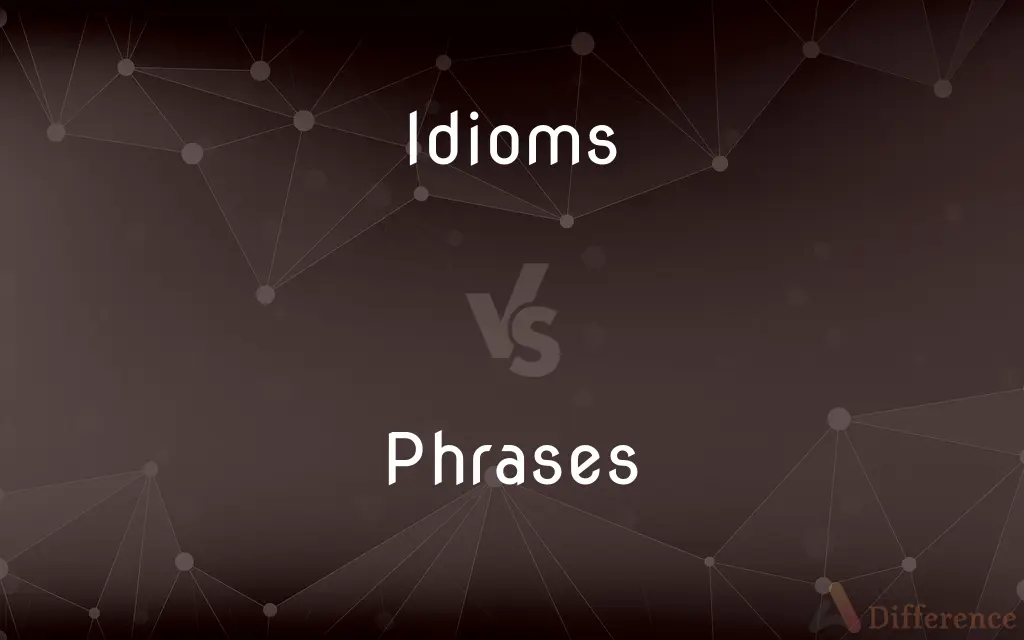Idioms vs. Phrases — What's the Difference?
Edited by Tayyaba Rehman — By Fiza Rafique — Published on December 9, 2023
Idioms are expressions with meanings not deducible from individual words; Phrases are groups of words without a subject and verb.

Difference Between Idioms and Phrases
Table of Contents
ADVERTISEMENT
Key Differences
Idioms are unique expressions that carry specific meanings, often unrelated to the literal interpretation of the words within them. For instance, "kicking the bucket" doesn't literally mean to strike a bucket with one's foot. Instead, this idiom conveys the idea of someone dying.
On the other hand, Phrases are collections of words that may not necessarily convey a distinct meaning when separated from their context. They don't have the complete structure of a sentence as they lack a subject, a verb, or both. For instance, "in the park" is a phrase that indicates a location but doesn't suggest any specific action or subject associated with that location.
Idioms often bring cultural, historical, or societal context into language, enriching communication. They might not make sense when translated word-for-word into another language. For instance, "bite the bullet" is an idiom meaning to face a difficult situation, but its literal translation might be puzzling to non-English speakers.
Conversely, Phrases can be more universally understood, as they often don't carry the same cultural baggage. A phrase like "under the table" can be understood literally (as an item being beneath a table), but it also has idiomatic interpretations in certain contexts (like secret transactions).
In essence, while Idioms offer colorful, often culture-specific expressions, Phrases provide the foundational building blocks of language, stringing words together to add depth and detail to communication.
ADVERTISEMENT
Comparison Chart
Definition
Expressions with non-literal meanings.
Groups of words without a subject and verb.
Literal Interpretation
Often doesn't make sense.
Typically makes sense.
Cultural Relevance
Highly culture-specific.
Less culture-specific than idioms.
Flexibility
Fixed and don't change.
Can be modified and adapted.
Translation
Might lose meaning in translation.
Usually retain meaning in translation.
Compare with Definitions
Idioms
Culturally specific linguistic expressions.
Bite the bullet means to face a challenging situation.
Phrases
Can be nouns, adjectives, adverbs, or prepositions.
A ray of sunshine describes something that brings happiness.
Idioms
Enrich language by adding depth and color.
Spill the beans means to reveal a secret.
Phrases
Building blocks in linguistic expression.
Piece of cake indicates that something is easy.
Idioms
Expressions not decipherable by individual words.
Break a leg is a way to wish someone good luck.
Phrases
Can be literal or figurative.
Down to earth describes someone who is practical and realistic.
Idioms
Convey abstract ideas in unique ways.
The ball is in your court means the next move is up to you.
Phrases
Groups of words without a full sentence structure.
On the fence describes someone who is undecided.
Idioms
Fixed expressions with non-literal meanings.
It's raining cats and dogs means it's raining heavily.
Phrases
A sequence of words that have meaning, especially when forming part of a sentence.
Idioms
A speech form or an expression of a given language that is peculiar to itself grammatically or cannot be understood from the individual meanings of its elements, as in keep tabs on.
Phrases
A characteristic way or mode of expression
An apt turn of phrase.
Idioms
The specific grammatical, syntactic, and structural character of a given language.
Phrases
A brief, apt, and cogent expression
The phrase "out of the frying pan and into the fire.".
Idioms
Regional speech or dialect.
Phrases
(Music) A short passage or segment, often consisting of four measures or forming part of a larger unit.
Idioms
A specialized vocabulary used by a group of people; jargon
Legal idiom.
Phrases
A series of dance movements forming a unit in a choreographic pattern.
Idioms
A style of artistic expression characteristic of a particular individual, school, period, or medium
The idiom of the French impressionists.
The punk rock idiom.
Phrases
To express orally or in writing
The speaker phrased several opinions.
Idioms
Plural of idiom
Phrases
To divide (a passage) into phrases.
Phrases
To combine (notes) in a phrase.
Phrases
To make or express phrases.
Phrases
(Music) To perform a passage with the correct phrasing.
Phrases
Plural of phrase
Phrases
Infl of phrase
Phrases
Enhance meaning in sentences.
With bated breath means with great anticipation.
Common Curiosities
Why are Idioms culturally significant?
Idioms often originate from historical, cultural, or societal events or practices, making them culture-specific.
Can idiomatic meanings be understood by literal translation?
No, idiomatic meanings often get lost or misinterpreted with literal translation.
Are there universal Phrases understood across cultures?
Many phrases have universal interpretations, but context is crucial to fully grasp their meaning.
How do Phrases differ from Idioms?
Phrases are groups of words without a complete sentence structure, while idioms have non-literal meanings.
How are Idioms different from slang?
While both are informal, idioms have more established usage, while slang is often transient and highly contemporary.
Do all languages have their own Idioms?
Yes, every language has idioms, reflecting its unique culture and history.
Can Phrases become Idiomatic over time?
Yes, some phrases can take on idiomatic meanings based on cultural or societal shifts.
What are Idioms?
Idioms are fixed expressions with meanings that aren't directly deducible from the individual words.
Do Phrases always convey the same meaning in different contexts?
No, phrases can be both literal and figurative, and their meaning can vary based on context.
Why is understanding Idioms important in language learning?
Idioms provide cultural context and enrich communication, helping learners become fluent and culturally aware.
Is it possible to change the structure of an Idiom?
Generally, no. Idioms have a fixed structure and altering them can change their meaning.
Are Idioms used in formal writing?
Generally, idioms are less common in formal writing but can be used for stylistic effect.
Is it necessary for a Phrase to have a verb?
No, phrases can lack both subjects and verbs.
How do I recognize an Idiom in a sentence?
Context is key. If a group of words has a meaning that seems disconnected from its literal interpretation, it might be an idiom.
Why are Phrases essential in language?
Phrases add depth and detail to language, enriching communication and aiding in the conveyance of ideas.
Share Your Discovery

Previous Comparison
Cost Centre vs. Profit Centre
Next Comparison
Cheeky vs. MischievousAuthor Spotlight
Written by
Fiza RafiqueFiza Rafique is a skilled content writer at AskDifference.com, where she meticulously refines and enhances written pieces. Drawing from her vast editorial expertise, Fiza ensures clarity, accuracy, and precision in every article. Passionate about language, she continually seeks to elevate the quality of content for readers worldwide.
Edited by
Tayyaba RehmanTayyaba Rehman is a distinguished writer, currently serving as a primary contributor to askdifference.com. As a researcher in semantics and etymology, Tayyaba's passion for the complexity of languages and their distinctions has found a perfect home on the platform. Tayyaba delves into the intricacies of language, distinguishing between commonly confused words and phrases, thereby providing clarity for readers worldwide.










































